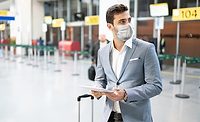When traveling for business, it’s necessary for safety precautions to extend beyond the typical nine to five working parameters. Throughout the entirety of a business trip, business travelers should remain diligent around the clock, taking additional precautions to ensure their personal safety. There are several security measures both a business and its mobile workforce should keep in mind as they book business travel accommodations, check into their hotels in remote locations and conduct business while in an unfamiliar area.
The end result of a company not addressing accommodation-related risks with staff could cause employees to feel unsafe, become unwilling to travel - or worse, can expose them to physical harm while traveling for business. While it is usually the responsibility of an organization to facilitate employee business travel, when it comes to hotel accommodation this does not always happen. Some employees may book their own accommodations when traveling for work, and oftentimes, their company requires them to stay within a certain budget, regardless of the location.
Mitigating accommodation-related risks may mean dedicating time to extensive research. When researching hotels, business travelers and those managing travel accommodations for an organization's mobile workforce may want to consider staying at establishments with surveillance in the lobby and around the grounds. In addition, selecting a hotel with security guards on the hotel grounds, well-controlled access to the main entrance of the hotel, and multilingual staff are paramount security measures to consider when researching the appropriate hotel for the business traveler.
Upon arrival, there are several requests that can be made to increase safety during a stay. At check-in, consider staying on a floor above ground level. International SOS recommends requesting to stay on floors two through six and in a room located near an emergency exit to facilitate an easier evacuation if needed. Staying on these recommended floor levels and near an emergency exit means that the traveler is still close enough to ground level in the event of an emergency evacuation, without adversely exposing themselves to risk of theft.
Upon entering accommodations, travelers should assess the safety of the room. Be sure to check for working locks on all doors and make sure to use deadbolt and secondary locks on all doors while in the room. Additionally, upon arrival, business travelers should confirm that all windows work and should familiarize themselves with the appropriate evacuation routes in case of an emergency. As an extra safety precaution, travelers can pack a doorstop and place it on the inside of the door. This will stop forced entry from anyone looking to enter your hotel room without permission. These precautions ensure not only safety but also peace of mind while in unfamiliar areas.
Additionally, all travelers should use the following tips to mitigate theft risks of personal and business belongings in a hotel room. The below tips can help minimize the likeliness of burglary:
- Hang the “Do not disturb” sign on the outside handle of the door
- This simple action signals that there are occupants in the room to potential intruders hoping to burglarize an empty room
- In higher risk locations, leave the TV and a light on inside
- Similarly to the tip above, leaving the TV and light on in the room can signal to intruders on the outside of the building that there are occupants in the room, potentially deterring criminals in hopes of stealing from an empty room
- Keep your room number a secret
- Always make sure to keep your room information private. When speaking of your room number in any circumstance, make sure to speak low to avoid others overhearing you
- Always carry a charged cell phone with local network access
- If for any reason your room or hotel becomes dangerous while you are not in the building, you should be able to contact others in an emergency
While Duty of Care dictates that the employer is responsible for the traveler’s safety, the tips above are simple ways that the traveler can also help themselves throughout their business trip. When it comes to personal safety during business travel, it is essential for business continuity that the traveler feels at ease throughout the entirety of the trip and using these additional safety procedures can ensure that happens.




